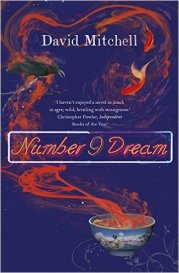
A Japanese teenager named Eiji Miyake is searching Tokyo for his father, the man that abandoned him at birth. Eiji thinks he’s cursed, has no money, no street smarts, and no clear plan to follow for either this quest or his life. The city he’s moved to changes from sunny business area to Yakuza infested red-light district—drenched in neon, alcohol, and shadow—at the turn of a street corner. He thinks his father might be a scum-bag. His apartment has cockroaches.
Things are not going well.
Fortunately, he has the help of a cat, a girl with a perfect neck, a crude landlord, and a slimy hacker to keep him sane, amidst intrigue, vivid dreams, and crushing guilt from his childhood that he can push down but never really ignore.
Number9dream is the kind of book that, if it connects with you, you will fall inside it and get happily lost there. The heat of Tokyo, the heartbreak of losing a twin, the desperation to find a parent: you feel these things in your chest rather than your head, the mark of a well-crafted story.
The writing is gorgeous but dense in a way that Mitchell shies away from in much of his other work. I don’t mean dense in terms of difficulty; Cloud Atlas and The Thousand Autumns of Jacob De Zoet are more challenging from a stylistic point of view. The density is due to how many of Eiji Miyake’s thoughts Mitchell packs into only one book; you may come away with the impression that you’ve lived a full nineteen-years in someone else’s head. There are tangents and diversions, but ultimately this novel is about what makes this young boy tick.
Number9Dream meanders through strange and difficult experiences, and the writing has page-long paragraphs that immerse you by switching between topics in an instant and ensuring you way attention and stay invested. The absurd and mundane are stirred together, as are reality and dreams: you don’t know when one ends and the other begins, but you’re sure to be surprised when you figure it out.
There’s a desperate search for identity and meaning, and a very twenty-first century rejection of easy answers to difficult questions. Miyake tries to be pro-active and dictate his fate, but the city of Tokyo has other plans for him, and throws him into one bizarre and dangerous situation after another. He doesn’t have an ounce of control, something many might find frustrating in a protagonist—but not me; this kept me interested to see what this novel’s universe, rather than characters, had in store.
According to Wikipedia (an always reliable source), this book draws heavily from Haruki Makumari. I’ve tried Makumari before and found him—specifically his novel Hard-Boiled Wonderland and the End of the World—dry and frustratingly vague. The comparisons of Number9Dream to his work, though, have made me think that I overlooked something special, and so I’ll be picking up The Wind-Up Bird Chronicle soon. I don’t want to miss out if I could be reading another novel like this one.